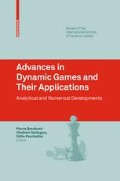Abstract
This article considers a cooperative approach to 2-player stopping games. It is assumed that the players cooperate in such a way as to maximise the sum of their expected payoffs. Hence, the value of the game to a coalition of both players is given by the optimal expected reward in an auxiliary problem, which involves the double stopping of a Markov chain by an individual. The value of the game is defined using a recursive procedure based on the form of the subgames played at each moment. The concept of Shapley value is used to define the value of a subgame. It is shown that, in games where one player always has priority, the Shapley value of the cooperative game is simply the unique Nash value of the game. In games involving random priority, players must coordinate their actions and use side payments to achieve the Shapley value. The side payments and coordination may be described in a preplay agreement made between the players. Aspects of the dynamic rationality of such agreements are considered using the concept of subgame consistency. An example based on the job search problem is given
Access this chapter
Tax calculation will be finalised at checkout
Purchases are for personal use only
Preview
Unable to display preview. Download preview PDF.
References
R. Amer and F. Carreras, Cooperation indices and weighted Shapley values, Math. Oper. Res. 22, (1997), 955–968.
R.J. Aumann, Subjectivity and correlation in randomized strategies, J. Math. Econ. 1, (1974), 67–96.
J. F. Banzhaf, Weighted voting doesn’t work: a mathematical analysis, Rutgers Law Rev. 19, (1965), 317–343.
D. T. Bishop and C. Cannings, A generalized war of attrition, J. Theor. Biol. 70, (1978), 85–124.
E. Dynkin, Game variant of a problem on optimal stopping, Soviet Math. Dokl. 10, (1969), 270–274.
E. Ferenstein, A variation of the Dynkin’s stopping game, Math. Japonica 38, (1993), 371–379.
J. Filar and L. Petrosjan, Dynamic Cooperative Games, Int. Game Theory Rev. 2, (2000), 47–65.
M. Fushimi, The secretary problem in a competitive situation, J. Oper. Res. Soc. Jap. 24, (1981), 350–358.
P. Neumann, D. Ramsey and K. Szajowski, Randomized stopping times in Dynkin games, Z. Angew. Math. Mech. 82, (2002), 811–819.
A. S. Nowak and T. Radzik, A solidarity value for n-person transferable utility games, Int. J. Game Theory 23, (1994), 261–282.
Y. Ohtsubo, A nonzero-sum extension of Dynkin’s stopping problem, Math. Oper. Res. 12, (1987), 277–296.
L. Petrosjan, Agreeable solutions in differential games, Int. J. Math. Game Theory Alg. 7, (1997), 165–177.
L. Petrosyan, A. Sedakov and A. Syurin, Multistage games with coalitional structure, To be presented at ISDG 2006.
L. Petrosjan and G. Zaccour, Time-consistent Shapley value allocation of pollution cost reduction, J. Econ. Dynam. Control 27, (2003), 381–398.
D. Ramsey and K. Szajowski, Correlated Equilibria in Competitive Staff Selection Problem, in Game Theory and Mathematical Economics, Banach Center Publications, Polish Academy of Sciences, Warsaw, Poland, 2006, pp. 253–265.
D. Ramsey and K. Szajowski, Correlated equilibrium in Markov stopping games, Submitted to Eur. J. Oper. Res. (2006)
L. S. Shapley, A value for n-person games, Contributions to the theory of games II. Princeton University Press, Princeton, NJ, 1953, pp. 307–317.
K. Szajowski, Markov stopping game with random priority, ZOR - Math. Meth. Oper. Res. 39, (1994), 69–84.
M. Yasuda, On a randomized strategy in Neveu’s stopping problem, Stochastic Proc. Appl. 21, (1985) 159–166.
D. W. K. Yeung and L. A. Petrosyan, Cooperative Stochastic Differential Games, Springer Series in Operations Research and Financial Engineering, Springer, Berlin, 2005.
D. W. K. Yeung and L. A. Petrosyan, Subgame Consistent Cooperative Solutions in Stochastic Differential Games, J. Opt. Theory App. 120, (2004), 651–666.
Author information
Authors and Affiliations
Corresponding author
Editor information
Editors and Affiliations
Rights and permissions
Copyright information
© 2009 Birkhäuser Boston
About this chapter
Cite this chapter
Ramsey, D., Cierpiał, D. (2009). Cooperative Strategies in Stopping Games. In: Pourtallier, O., Gaitsgory, V., Bernhard, P. (eds) Advances in Dynamic Games and Their Applications. Annals of the International Society of Dynamic Games, vol 10. Birkhäuser Boston. https://doi.org/10.1007/978-0-8176-4834-3_21
Download citation
DOI: https://doi.org/10.1007/978-0-8176-4834-3_21
Published:
Publisher Name: Birkhäuser Boston
Print ISBN: 978-0-8176-4833-6
Online ISBN: 978-0-8176-4834-3
eBook Packages: Mathematics and StatisticsMathematics and Statistics (R0)

